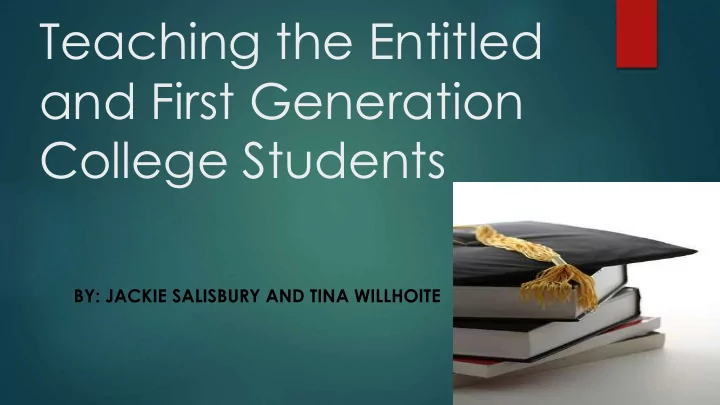

Teaching the Entitled and First Generation College Students BY: JACKIE SALISBURY AND TINA WILLHOITE
What does it mean to be entitled ? Webster defines entitled as “a right or claim to”. Deserving/Merited
Students’ Entitlements in Education Include: Fairness Honesty Understanding Well prepared lectures Due process Clear communication Challenges Connection Collaboration Teaching to Learning Differences Respect
HOWEVER , entitled educational benefits differ from an attitude of entitlement.
Academically entitled students might believe: Make – up tests should be allowed To come late or leave early Passing grade should be given Retest or extra credit Extended time
Why do students have a sense of entitlement? Parents Shift in social paradigms Former schooling
Strategies for Responding to Entitlement in the Classroom Explicit expectations Negotiation E xamples of “excellent” work Case in writing Socialize to assume responsibility Follow Institutional responses
Are You Enabling Students to Have a Sense of Entitlement in Your Class ? Ignore unacceptable behavior ? Put your own needs and desires aside ? Trouble expressing your own emotions ? Feel fearful ? Cover for someone else’s mistakes ? Continue to offer help when unappreciated ?
As Teachers We Need to Enable Student Success…. HOW ?
Be where you are .
Set a schedule for the week… get organized.
Reward yourself. Remember that you are only human.
Use your support system.
Have some fun .
Learn to say ‘NO.’
Know when you need help.
First-Gen — Who Are First-Gen Students? Students whose parent(s)/legal guardian(s) either have no college experience or didn’t earn a bachelor’s degree at a four -year college or university Students can come from families with low incomes or from middle-or higher-income families without a college-going tradition
General Characteristics Students are more likely to: Be older and many are married Have lower incomes Have dependents Attend on a part-time basis Work at least one job
General Characteristics Students are more likely to: Need college prep classes Choice of college is often based on locality to their home or work
General Characteristics Students were more likely to: Take longer than their peers to complete their education Students more likely to be a member of a racial or ethnic minority group
Areas of Focus: Financial, Psychological, Academic, College 101 Financial Awareness — Navigating FAFSA Difficult wording and very long Submit annually Parents often lack technical skills Students often complete application FAFSA scams
Financial Responsibility Do not understand debt ratio Unable to manage financial aide beyond tuition expenses Juggling money
Financial responsibility Extra curricular activities Unplanned expenses Working to supplement other income
Psychological Effects Parents lack the knowledge or background experiences Feel isolated from their peers/not fitting Rising above family’s social stratosphere, they feel guilt
Psychological Effects Continuing to try and help at home with finances, other siblings, or household chores Carry financial burdens Feel stigmatized
College 101 How Educators Can Help Identify First-gen students early and reach out to them Involve their families Provide opportunities to help with FAFSA college applications Work with other organizations/emphasize opportunities
College 101 How Educators Can Help Summer orientation First-Gen only Enlist current and former First-gen students Create a First-gen living-learning community Create small cohorts for First-gen students
College 101 How Educators Can Help Establish and support First-gen student organizations Create, and reward, leadership opportunities Offer alternatives to remediation courses Focus on the entire student lifecycle
Websites for First-Gen Students www.iamfirst.org www.nacada.ksu.edu www.firstgenerationstudent.com www.firstinthefamily.org www2.edgov www.collegeadmissioncoach.com
Recommend
More recommend